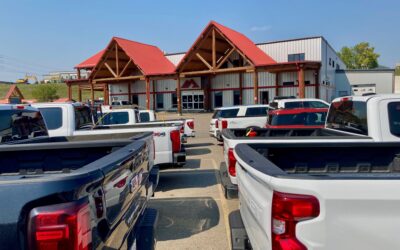Uncertainty Still a Concern for Most Fleets
The current COVID-19 pandemic has certainly slowed down the global economy and impacted fleet industries across the world, particularly in the US. With that said, according to a survey by Geotab, 80% of fleets are back to work full time. Meanwhile, 90% of them firmly believe that their business will survive through the coronavirus pandemic as their fleet returns to work. However, most fleet companies are expecting to face a major income loss. Moreover, 52.4% of survey respondents noted that they were unsure about when their companies will start operating at normal capacity.
Post COVID-19, fleet companies will continue to focus on their fleet operations, asset utilization, improved efficiency, productivity, and cost reduction avenues. According to Industry Pulse Checks from Geotab, fleets will continue to operate this way regardless of the global economic and financial impact of coronavirus. This analysis is based on the fleet activity measurement of 24 specific industries.
The pulse check also discovered that respondents said that travel has been greatly reduced and they were a bit uncertain as to when it will return to normal. This also means that there will be fewer face-to-face meetings in the fleet industry and increased engagement with webinars. Similarly, there will also be a reduction in the mileage activity of fleets. Moreover, fleets are understandably expected to incorporate various cost-cutting measures into their operations for their 2020-2021 run. This means that there might be a change in the way fleets operate and there might be fewer vehicles running in the fleets.
Let’s see how the corona virus and the current state of affairs have affected the business of various industries.
The Effects of the Pandemic on Various Industries
Here’s how the COVID-19 pandemic has affected various industries, including the fleet industry:
Healthcare
The healthcare industry has been significantly affected by the pandemic due to the high demand for essential frontline workers and caregivers. Moreover, there has been a surge in demand for personal protective equipment and supplies. The pandemic has impacted not just the healthcare industry areas that are directly related to COVID-19 but also non-essential healthcare. This is why most businesses in the healthcare industry are expecting a considerable decline in their turnover margins for the rest of this year.
Last-Mile Delivery Services
Meanwhile, last-mile delivery services have seen an incredible boost in their business due to the pandemic. These companies communicate constantly with their supply chain to make sure that their product deliveries are timely and to keep up with the constant demand. The demand for everyday items and essentials increased due to the COVID-19 lockdowns.
Government Fleets
According to Geotab, the government fleets have established a two-pronged response to COVID-19. Most of the provincial, state or local agency fleets such as fire, police, EMS, and DOT are operating at maximum or over-capacity to cater to the pandemic. Meanwhile, other fleets such as school buses, DOE, and parks have been shut down. On the other hand, federal fleet activity remains largely unaffected. However, an interruption in OEM vehicle deliveries has resulted in major challenges for rental and leasing operations.
All in all, long-haul fleets are expecting the demand for freights to increase again and for it to impact their fleet operations positively. A large majority of fleets expect to see a continuous boost of freight levels over the coming 30 to 90 days, while a few smaller fleets expect to face a decrease.
Rideshare and Car Rental Services
In the first few months after the COVID-19 lockdown carshare, rideshare, and car rental companies saw a massive 70% to 90% decrease in their business. It’s being estimated that business for such industries will not recover or revert to the old, pre-pandemic “normal” because of the increasing acceptance of video chat meetings. This expected dip in business travel will impact the car rental industry in the long run as it relies quite heavily on business travel.
Construction Industry
The construction industry is one of the few industries that hasn’t been affected by the pandemic. According to Geotab, construction work remains underway even in the middle of the coronavirus crisis. Even though the pandemic hasn’t affected the business in the short term, it’s been predicted to have certain long term effects. This is particularly true for contract work in the industry, which has forced employees to continue working on the job site despite the current times.
Insurance Companies
For the insurance industry, claim management staff reveals that vehicle activity slowed down significantly during the concluding half of March and the beginning of April due to COVID-19. However, the industry is slowly recovering. With that said, there’s a stark difference in the percentage of vehicle activity in this industry from February to early June; in February, fleet utilization ranged from 60% to 70%, while in early June, it dropped to the range of 29% to 55%.
Oil and Gas Industry
For the oil and gas companies, their prices were already inhibited due to the global competition before COVID-19. However, the lockdown certainly exacerbated the issue as it led to an unprecedented and instant drop in demand. This caused major issues such as where to store the unused, unbought excess oil and it also led to an unbelievable drop in prices. This largely affected smaller exploration companies that couldn’t sustain themselves on such prices due to their heavy debt load.
What’s Next?
Now that the COVID-19 pandemic has forced companies in different industries to accept their new reality, they are looking for new and innovative ways to deal with the effects of the pandemic. They are actively looking to implement new corporate safety policies as well. Companies also want new ways to stay in touch with their suppliers and to boost their communication.
As for the overall impact of the pandemic on businesses, the pulse check discovered that:
- 6% of businesses were significantly impacted
- 6% of businesses reported that they were slightly impacted
- 3% of businesses reported that their competitors were significantly impacted
- 1% of businesses said that they couldn’t currently predict whether they will face additional reductions in the workforce in the coming 6 months or not
- 3% of businesses reported that the pandemic impacted their customer base significantly
Among the bellwether companies that participated in the study, only one company had less than 500 fleet vehicles. Meanwhile, the others were large businesses with more than 500 vehicles running as their fleet returns to work.
How Summit Fleet Can Help
The COVID-19 pandemic has forced businesses to contemplate and strategize for a new normal. Due to the various effects of the pandemic on different industries, businesses including fleet companies, are trying to find new and inventive ways to keep running smoothly. Many companies have found that renting part of their fleet has helped dramatically with asset utilization and by keeping finances in check.
Summit Fleet can assist by helping you right-size your fleet. Because you may not need as many trucks as you did pre-Covid-19, Summit Fleet can help fill in the gaps to ensure you’re getting as close to 100% utilization as possible. Many organizations are finding that it makes sense to sell the vehicles that are sitting in the back lot right now and to rent the rest to fill in those gaps when necessary. Not only does this help achieve better fleet utilization, it also frees up capital that would otherwise be tied to non-utilized assets.
Let us know if you are ready to improve your fleet utilization and free up financing for other important initiatives in your organization. Call us today and we can further explain the myriad benefits of renting with us!
Source:
https://www.automotive-fleet.com/10121479/most-fleets-are-back-to-work-though-uncertainty-remains






